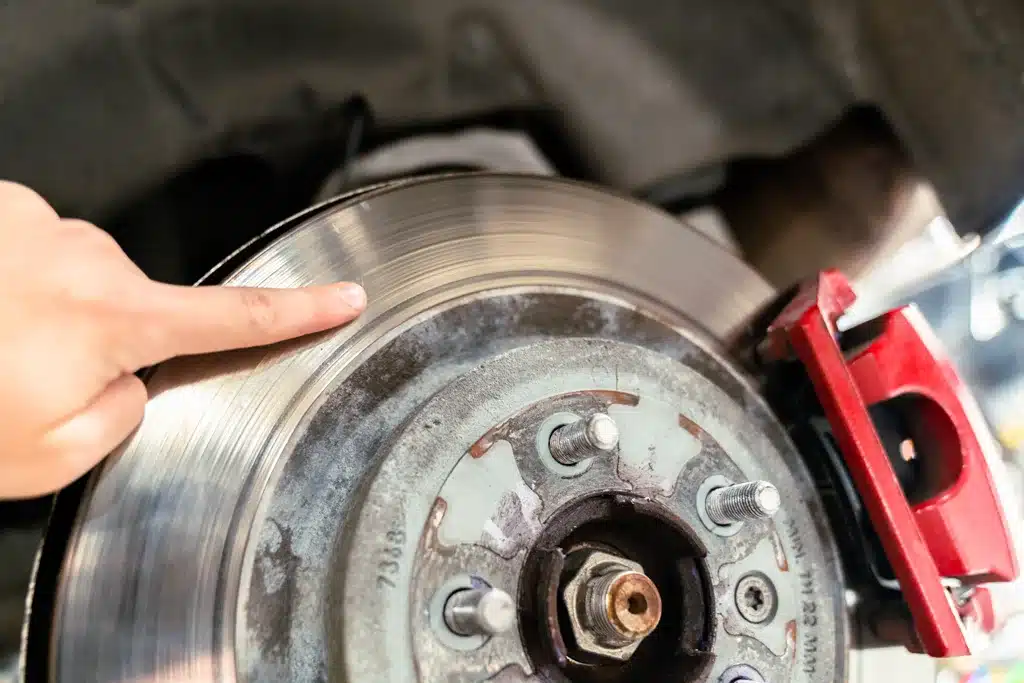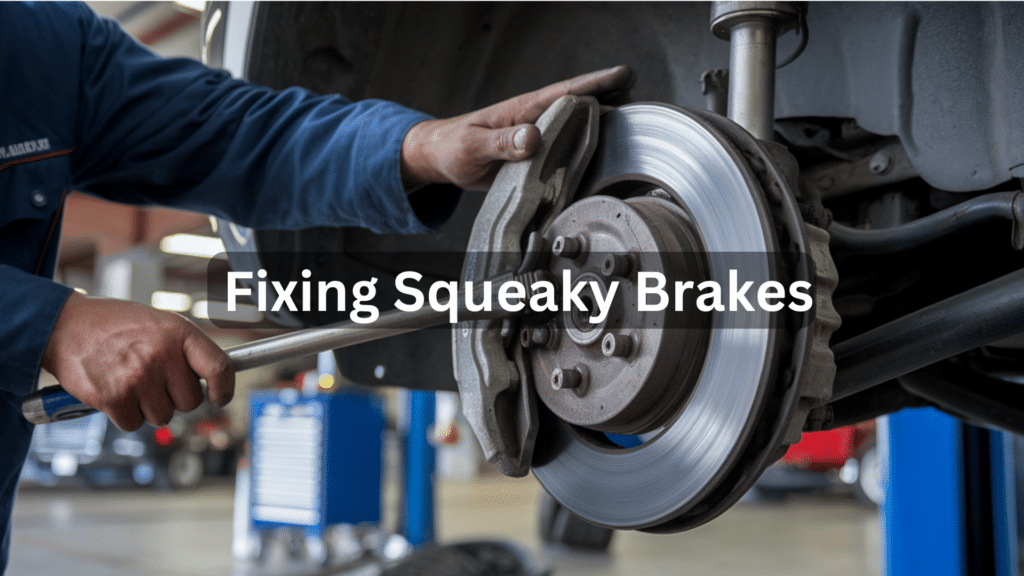When you install new brakes on your car, the last thing you want to hear is a high-pitched squeak every time you slow down.
It’s frustrating and might make you wonder if something’s wrong with your brand-new brakes. Don’t worry. This is a common issue that many car owners (including me) have dealt with, and it’s usually not as serious as it sounds.
In this guide, I’ll walk you through why new brakes squeak, how to figure out what’s causing it, and what you can do to fix it. I’ve been through this, so I know how annoying it can be.
Let’s get those brakes quiet again!
Why Are My New Car Brakes Squeaky?

The science behind squeaky new brakes is pretty interesting. When brand-new brake pads press against the rotors, they don’t yet fit perfectly.
The two surfaces aren’t completely smooth against each other, creating tiny vibrations when they touch. These vibrations create sound waves – that’s the squeak you hear!
Think of it like rubbing a wet finger around the rim of a glass. The friction causes vibrations, which make a sound. Your brakes work the same way.
The materials in new brake pads contain bits of metal, fiberglass, and ceramic that need to wear down a bit and create a smooth surface.
During this “bedding-in” process, those tiny vibrations happen, and that’s why you hear that annoying squeak. Once everything fits together better, the noise usually goes away.
How to Identify Squeaky Brakes
When I first notice squeaky brakes, I try to pay attention to exactly when the sound happens.
Here’s what I listen for:
- A high-pitched squeal when I press the brake pedal
- Squeaking that only happens when my foot is on the brake
- Noises that occur at low speeds, like when I’m pulling into my driveway
- Sounds that change depending on how hard I press the brake
I’ve found that new brake squeaks usually sound different from worn-out brake squeaks. New brake squeaks tend to be cleaner and higher-pitched, while worn-out brake noises are often rougher and might include grinding sounds.
What Might Be Wrong
Well, you might think you got scammed because of the poor brake quality after buying your first-ever new car. But you shouldn’t worry enough, because this is a common issue that a lot of new car owners face.
If your new brakes are squeaking, here are the most likely reasons I’ve discovered:
- Break-in Period: Just like I mentioned, new brakes need time to adjust. The brake pads and rotors need to create a smooth, even contact surface with each other.
- Glazed Brake Pads: Sometimes, if I brake too hard when the pads are new, the material can heat up and form a hard, shiny layer called “glazing.”
- Low-Quality Brake Pads: I’ve learned that cheaper brake pads often contain more metal, which can cause more noise. Higher-quality pads usually have better materials that reduce squeaking.
- Dirty Brakes: Sometimes dirt, dust, or small rocks get caught between the pads and rotors, causing that annoying squeak.
- Moisture and Rust: If my car sits overnight in the rain or high humidity, a thin layer of rust can form on the rotors, leading to squeaks until it wears off.
Steps You Should Take Immediately
As I said earlier, it is a fixable issue that doesn’t require much unnecessary attention. I have seen many car owners make the mistake of replacing their new car because of this problem, which isn’t supposed to be the case.
When I hear my new brakes squeaking, here’s what I do:
- Don’t Panic: First, I remind myself that squeaking with new brakes is normal. If my car still stops well and the pedal feels normal, I know it’s probably not a safety issue.
- Drive Carefully: I take my car for a gentle drive on an empty street or parking lot. I do 10-15 mild stops from about 30 to 5 mph. This helps wear away any glazing and helps the pads seat properly against the rotors.
- Clean the Brakes: Sometimes, I spray brake cleaner (you can get this at any auto parts store) on the rotor edges to remove any dirt or manufacturing residue. Make sure to follow the instructions on the can!
- Listen for Changes: I pay attention to whether the squeaking improves or worsens after driving for a while. If it improves, it was probably just the break-in period.
- Check with a Mechanic: If the noise doesn’t go away after a few days of normal driving, I take it to a mechanic. It’s better to be safe than sorry when it comes to brakes.
How to Prevent Squeaky Brakes
If you don’t want to spend your hard-earned money on regular trips to the mechanic, there are many tips and tricks you can follow to fix the issue yourself.
I’ve learned a few tricks over the years to help prevent brake squeaks from happening in the first place:
- Choose Quality Parts: I always try to buy good quality brake pads, even if they cost a bit more. Ceramic pads tend to be quieter than semi-metallic ones.
- Proper Installation: I ensure brake pads are installed correctly, with all the little parts like anti-rattle clips and shims in the right place.
- Break Them In Gently: I avoid hard stops for the first 200-300 miles after installing new brakes unless it’s an emergency. This gives the brakes time to break in properly.
- Keep Them Clean: I try to avoid driving through deep puddles right after getting new brakes, and I wash my wheels regularly to keep dirt from building up.
- Apply Anti-Squeal Compound: Sometimes, I use a special brake lubricant on the back of the pads (not on the friction surface!) to reduce vibrations that cause squeaking.
Common Causes
From my experience, these are the most common reasons why new brakes might squeak:
- Manufacturing Residue: New rotors often have a protective coating that needs to wear off.
- Missing Hardware: Sometimes, small parts like clips or shims are forgotten during installation.
- Weather Conditions: Cold mornings or high humidity can cause temporary squeaking.
- Brake Design: Some brake designs are just naturally noisier than others.
- Uneven Rotor Surface: If rotors aren’t perfectly flat, they can cause noise until they wear evenly.
Conclusion
I’ve learned that squeaky new brakes are usually more annoying than dangerous. In most cases, the noise goes away after a proper break-in period of 300-400 miles of normal driving.
However, if the noise persists or you notice any changes in how your car stops, it’s always best to have a professional check it out.
Remember, your brakes are one of your car’s most important safety features. While some squeaking is normal, always trust your gut if something feels wrong with how your car stops; don’t ignore it.
Frequently Asked Questions
How Long Will My New Brakes Squeak?
In my experience, most new brake squeaks disappear after about 300-400 miles of normal driving as the pads and rotors break in.
Are Squeaky Brakes Dangerous?
Not usually. If your car still stops normally and the pedal feels right, squeaking alone is rarely a safety issue. But if you have any doubts, I always recommend getting them checked.
Can I Make the Squeaking Stop Faster?
I’ve found that doing 10-15 medium-strength stops (not hard enough to skid) from around 30 mph can help speed up the break-in process.
Should I Return to The Shop if My New Brakes Squeak?
If the squeaking doesn’t improve after about a week of normal driving, I would return it to the shop. Most good mechanics will check them for free.
Can the Weather Affect My Brakes?
Yes! I notice more squeaking on cold mornings or in humid conditions. This type of squeaking usually goes away after driving for a few minutes.

